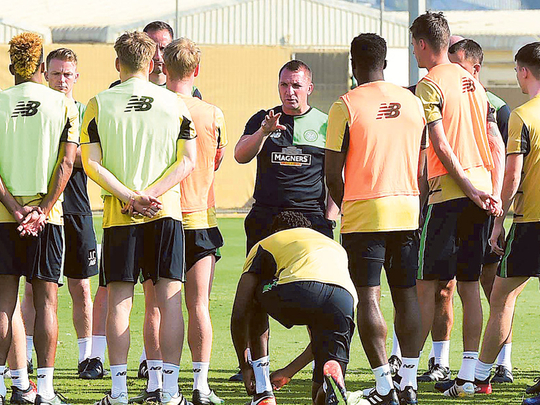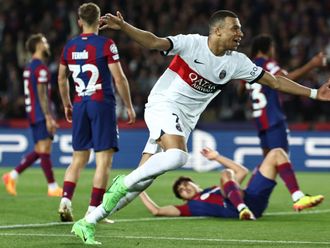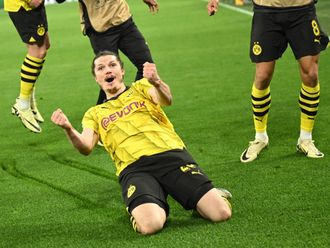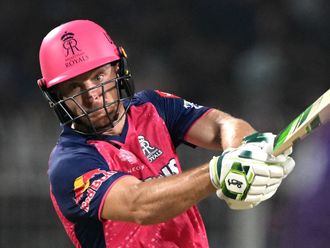
Dubai: Celtic manager Brendan Rodgers has a problem.
No, honestly.
Nineteen points clear of rivals Rangers in the Scottish Premiership at the winter break and unbeaten domestically with just one league draw? Tick.
A comfortable 3-0 Scottish League Cup final triumph over Aberdeen in November that earned the former Liverpool boss his first major trophy as a manager – and keeps Celtic on course for a treble in his first season in charge? Tick.
Earning Celtic Champions League qualification for the first time since 2013/14 and achieving two draws against Manchester City in the group stage? Big check there too.
And signing a striker, Moussa Dembele, from Fulham in the summer for pounds 500,000 whose form has been so impressive – 19 goals, including a double versus City, with five of his 14 domestic strikes against Rangers – that he is now valued around the pounds 30 to 40 million mark. In the financial backwater of Scottish football, there’s a very big check – or indeed cheque – there too.
Therein, however, lies the problem, as Rodgers readily admits during a breather from Celtic’s winter-break training in Dubai at Al Wasl Club earlier this week.
“If you finish bottom of the Premier League you get pounds 100 million,” Rodgers, Anfield manager from the summer of 2012 to October, 2015, says.
“If you win the Scottish (Premiership) you get pounds two million.”
“The only thing that Celtic doesn’t have,” Rodgers adds, “is the propaganda that is the Premier League. In every other aspect of football Celtic is a huge club - fan base, stadium and history. They have a fantastic history. What they don’t have is an opportunity to play in the Premier League.”
|
|
"The bigger battle for the club will probably be convincing him to resist the seduction of ‘Premier League propaganda’ for the satisfaction of local bragging rights. |
Celtic’s history was made in the days when they were European elite. The first British winners of the European Cup, in 1967, Celtic also reached the final in 1970 and semi-finals in 1972 and 1974. Since the inception of the Champions League, however, Celtic have reached the last 16 just three times.
And having finished bottom of their Champions League group this season – Barcelona took seven off them at Camp Nou, though the City results and another draw in Germany against Borussia Monchengladbach were encouraging – Rodgers is very honest when asked how far away Celtic are from being a last 16 team once more.
“We still have a bit of work to do,” he admits.
“It’s very difficult. You could be a fantastic team and still not get through. But what’s most important for me is building and growing the club - and what’s important first and foremost for that is qualifying for the Champions League. And to do that you need to win your league.
“It comes hand in hand, but Champions League year in, year in is what we strive for.”
Along with other former elite names of European football such as Ajax who have been heavily impacted as teams from the ‘Big Five’ nations get ever richer, that’s easier said than done. Coming from lowly Uefa-ranked Scotland, Celtic currently have to progress through three qualifying rounds before the group stages – and potentially four come the revamp of the competition.
“The No.1 target is to win the league in order to have a chance to qualify and then qualification second – then third is to get out of the group stages,” adds the Northern Irishman, who Celtic reportedly made the highest paid manager in Scottish football history.
“It’s never easy because of the finances and everything else involved. But it’s a fight and that’s excitement for us.”
With Celtic chasing six Scottish league titles in a row, a great opportunity exists to exceed the nine crowns won successively in the 60s and 70s. A record matched by Rangers in the 80s and 90s.
The fight for domestic dominance and Champions League progression may excite Rodgers, who grew up supporting Celtic, but despite that, the bigger battle for the club will probably be convincing him to resist the seduction of ‘Premier League propaganda’ for the satisfaction of local bragging rights.
This after all, despite the social media mirth directed at him towards the end of his time at Anfield for the “great character” post-match comments, is the man who has by far come the closest to winning Liverpool a league title in 27 years.
He actually mentions ‘Liverpool’ first in the interview with local media, commenting it was “important for me when I left a club like Liverpool to have a breather but then in my next job I needed pressure – and there’s a pressure at Celtic. It’s a huge club, there’s an expectancy to win every game.”
But further probing about his own spell – and everyone remembers Steven Gerrard’s costly slip against Chelsea, the draw at Crystal Palace and the crushing conclusion to the 2013/14 campaign – is met with: “I’ve nothing to say on that.”
He concedes slightly to discuss his replacement Jurgen Klopp’s current crop.
“Yeah, yeah, I do, I do,” Rodgers replies when asked if second-placed Liverpool can win the league this season.
“Brilliant club, fantastic club.
“I had a great time there and obviously with playing one game a week that helps you. I had that there myself when we just finished runners-up. But it’s a tight competition between six teams, so it’ll be interesting to see how it goes.”
While “Chelsea, Liverpool, Tottenham” have particularly impressed him, he has “no favourites for it”.
A query on his thoughts on the big-name managers now in charge of top Premier League clubs is met with the response: “Yeah, it’s difficult for British coaches. “Maybe we don’t jump about so much – run up and down the touchline so much. It’s ever-changing both from a playing and managing perspective the Premier League.”
Rodgers insists he is “not really worried, not bothered” when asked if he envisages going back to the Premier League.
“Football is a global game,” he says.
“I’ve been there and I’m happy not to be there now, I’m enjoying a new experience at Celtic, a huge club. If I go back there one day, great. If I don’t there’s no drama. It’s a global game.”
Spain then, perhaps?
“Yeah, in football I’ll be coaching for maybe 20 years so I’ll enjoy the travel and see where it takes me,” the Spanish-speaker says.
That’s a nice problem to have then.
And for now Rodgers’ biggest problem is a trip to a store to find a mantelpiece big enough to take the weight of all the gongs coming his way.
The far weightier problem is finding the way to return Celtic to the mantle that he and many others believe they belong.










